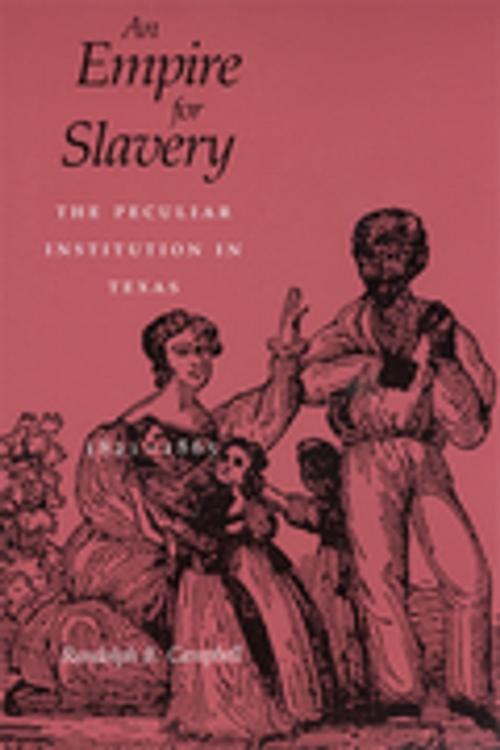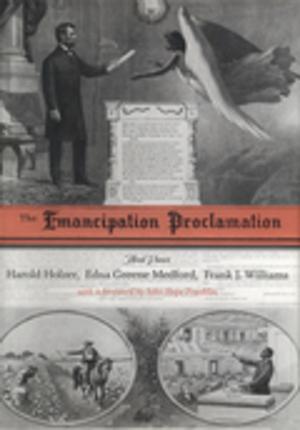An Empire for Slavery
The Peculiar Institution in Texas, 1821–1865
Nonfiction, History, Americas, United States| Author: | Randolph B. Campbell | ISBN: | 9780807161715 |
| Publisher: | LSU Press | Publication: | August 1, 1991 |
| Imprint: | LSU Press | Language: | English |
| Author: | Randolph B. Campbell |
| ISBN: | 9780807161715 |
| Publisher: | LSU Press |
| Publication: | August 1, 1991 |
| Imprint: | LSU Press |
| Language: | English |
Because Texas emerged from the western frontier relatively late in the formation of the antebellum nation, it is frequently and incorrectly perceived as fundamentally western in its political and social orientation. In fact, most of the settlers of this region were emigrants from the South, and many of these people brought with them their slaves and all aspects of slavery as it had matured in their natives states.
In An Empire for Slavery, Randolph B. Campbell examines slavery in the antebellum South's newest state and reveals how central slavery was to Texas history. The "peculiar institution" was perhaps the most important factor in determining the economic development and ideological orientation of the state in the years leading to the Civil War. Campbell points out that although the area of slaveholding in Texas covered only two-fifths of the state by 1860, this area alone was as large as Alabama and Mississippi combined and constituted "a virtual empire for slavery." By the outbreak of the Civil War, the proportion of slaveholders and slaves in Texas was comparable to that of Virginia, the oldest slaveholding state in the Union.
Utilizing records such as federal censuses, wills and other probate papers, and the WPA slave narratives, Campbell raises a number of questions concerning the nature of slavery in Texas. What factors encouraged the adoption of slavery? Under what conditions did the Texas slaves exist? What was the societal impact of slavery in this new state? How did the Civil War itself affect slavery in the state?
Campbell also reviews the proslavery argument put forward by many early Texas statesmen. What emerges is a picture of a state whose political future was sen as dependent upon the continuance of slavery and whose role in the Civil War was determined by this choice. As a result of this study, Texas is revealed as a state not unlike those of the older South. An Empire for Slavery is the first examination of the "peculiar institution" as it existed in Texas. Historians and general readers alike will find it an essential examination of the region, the period, and the phenomenon of slavery.
Because Texas emerged from the western frontier relatively late in the formation of the antebellum nation, it is frequently and incorrectly perceived as fundamentally western in its political and social orientation. In fact, most of the settlers of this region were emigrants from the South, and many of these people brought with them their slaves and all aspects of slavery as it had matured in their natives states.
In An Empire for Slavery, Randolph B. Campbell examines slavery in the antebellum South's newest state and reveals how central slavery was to Texas history. The "peculiar institution" was perhaps the most important factor in determining the economic development and ideological orientation of the state in the years leading to the Civil War. Campbell points out that although the area of slaveholding in Texas covered only two-fifths of the state by 1860, this area alone was as large as Alabama and Mississippi combined and constituted "a virtual empire for slavery." By the outbreak of the Civil War, the proportion of slaveholders and slaves in Texas was comparable to that of Virginia, the oldest slaveholding state in the Union.
Utilizing records such as federal censuses, wills and other probate papers, and the WPA slave narratives, Campbell raises a number of questions concerning the nature of slavery in Texas. What factors encouraged the adoption of slavery? Under what conditions did the Texas slaves exist? What was the societal impact of slavery in this new state? How did the Civil War itself affect slavery in the state?
Campbell also reviews the proslavery argument put forward by many early Texas statesmen. What emerges is a picture of a state whose political future was sen as dependent upon the continuance of slavery and whose role in the Civil War was determined by this choice. As a result of this study, Texas is revealed as a state not unlike those of the older South. An Empire for Slavery is the first examination of the "peculiar institution" as it existed in Texas. Historians and general readers alike will find it an essential examination of the region, the period, and the phenomenon of slavery.















